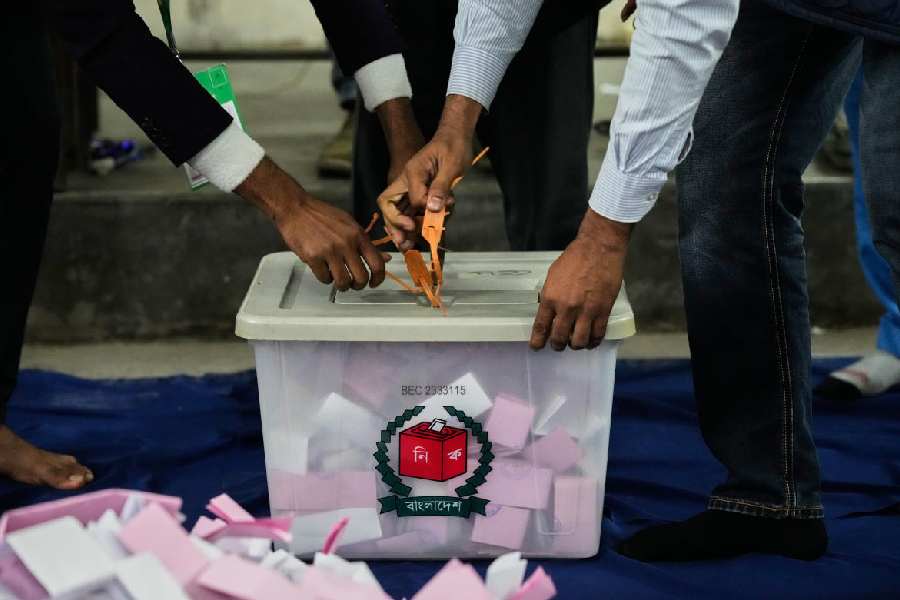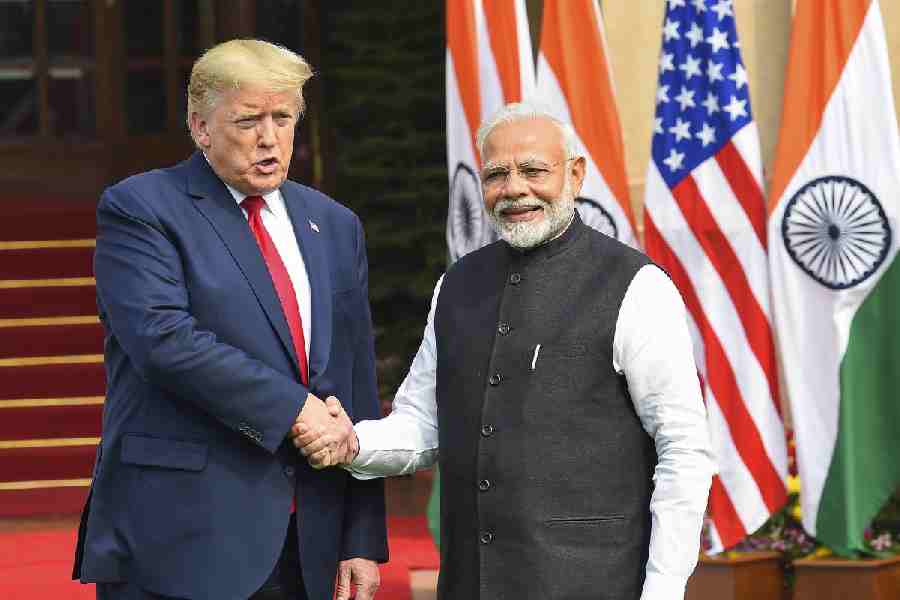 |
 |
| Narendra Modi (top), Rahul Gandhi |
Washington, Sept. 14: A Congressional Research Service (CRS) report on “India: Domestic Issues, Strategic Dynamics and US Relations” is likely to be used by Gujarat chief minister Narendra Modi’s legion of American supporters to bring about a normalisation of relations between the state government and the US administration.
The report, in restricted circulation among US legislators and some organisations here, says “perhaps India’s best example of effective governance and impressive development is found in Gujarat, where controversial chief minister Narendra Modi has streamlined economic processes, removing red tape and curtailing corruption in ways that have made the state a key driver of national economic growth.”
Joining the ongoing speculation in India about the BJP’s choice of a prime ministerial candidate in the 2014 general elections, the report adds that “among the party’s likely candidates for the prime ministership in future elections is... Modi, who has overseen impressive development successes in his state.”
The CRS, however, acknowledges that he “is also dogged by controversy over his alleged complicity in lethal anti-Muslim rioting there in 2002.”
In private conversations, American officials, both Democrats and Republicans, acknowledge that one of their biggest mistakes in dealing with an emerging India was their decision to antagonise Modi by scuttling his plans to visit the US in March 2005.
They believe the Bush administration’s ill-advised decision not to process his diplomatic visa pushed Modi towards China, Japan and South East Asia in tying up economic deals between Gujarat and Asian regions.
Nor did it bring the US the political dividends that then secretary of state Condoleezza Rice expected from New Delhi. The ministry of external affairs formally criticised the US mistreatment of an elected chief minister.
Ever since the folly of a visa denial for Modi sank in, the Americans have been quietly trying to make amends, but the BJP’s poster boy for development has been pursuing methods of his choice in dealing with this US dilemma.
He appointed a lobbying firm in Washington to protect and promote Gujarat’s interests, thereby effectively eliminating any real need for the chief minister to have direct dealings with the Americans.
Teams of officials from the state who came on roadshows to the US to promote “Vibrant Gujarat,” the state’s version of “Pravasi Bharatiya Divas,” the annual gathering of overseas Indians, have received enthusiastic response across America year after year.
The US consul general in Mumbai and the consulate’s staff regularly travel to Gujarat for meetings with the state government, but these are seldom publicly acknowledged.
The authorities here realise that the only sections of Americans who have been pleased by the hands-off policy towards Modi in 2005 are the non-governmental organisations promoting human rights, some Muslim groups and Congressionally-mandated bodies such as the United States Commission for International Religious Freedom.
Actually they thrive on people like Modi and remain relevant by criticising government responses to events like the Gujarat violence in 2002. But these groups continue to have influence on Capitol Hill and in vocal town halls, especially in liberal US states.The CRS report on India will certainly help break down resistance on Capitol Hill to a rapprochement with Modi. If and when that happens, Gujarati Americans, who run one of the most powerful interest groups in the US, are certain to push for a visit by Modi to America.
Gujaratis control the US motel industry and, therefore, are represented in every town and city in America. An example of how they view Modi is illustrated by the following description of the BJP leader in a leaflet prepared for his aborted visit six and a half years ago.
“Hon. Narendra Modi is heralded by his contemporary politicians and Indian media as one of the brightest, intelligent, hard working, competent, and visionary dynamic leaders.... The vast and vibrant Gujarati community is very eager to understand this worthy son of Gujarat and to listen to his vision in reshaping Gujarat as the front running state in India.”
While CRS reports do have an impact on Congressmen, Senators and others who read them, it would be a mistake to take them for any US policy position. The reports are merely reading material for legislators here in analytical format.
The CRS describes its role in the following words: “The Congressional Research Service works exclusively for the United States Congress, providing policy and legal analysis to committees and Members of both the House and Senate, regardless of party affiliation.”
Its utility has been that “as a legislative branch agency within the Library of Congress, CRS has been a valued and respected resource on Capitol Hill for nearly a century. CRS is well-known for analysis that is authoritative, confidential, objective and non-partisan. Its highest priority is to ensure that Congress has 24/7 access to the nation’s best thinking.”
However, most of its reports are based on already published material, especially media stories. The CRS has few independent sources or any structure by which it gains exclusive or special insights.
In fact, its reports are usually very basic and routine, meant to educate US legislators who may be dealing with a particular issue in Congressional Committees or on the legislature floor and may not be fully conversant with details of that issue.
How basic the CRS reports are is illustrated by this very passage from its new report on India. “At present, the BJP president is Nitin Gadkari, a former Maharashtran (sic!) official known for his avid support of privatisation. Although still in some disorder in 2011, there are signs that the BJP has made changes necessary to be a formidable challenger in scheduled 2014 polls.”











